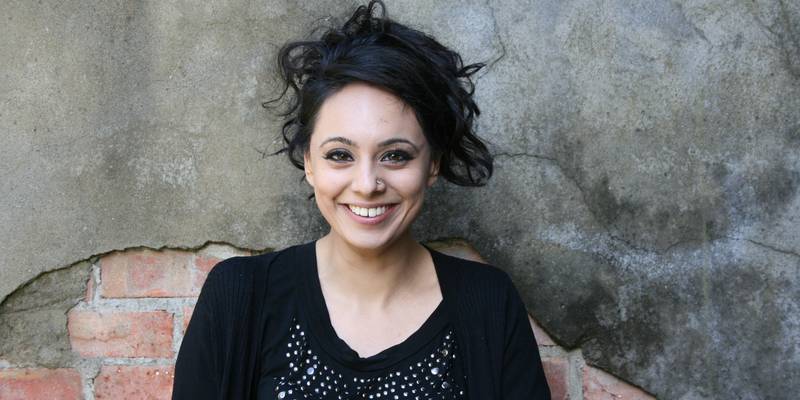Pavan Amara doesn’t have Twitter. “There’s a reason for that,” she tells me. “I think it’s pretty useless most of the time. It’s really useful in places like the Middle East where freedom of speech is curtailed, but I think in this country, people will tweet and they’ll forget about it in the next second.”
It’s one of the reasons the 29-year-old former journalist is so keen for the #MeToo movement to move offline as well. In the past few months, millions of women have used social media platforms to share their stories of sexual assault and harassment, with Google searches for the term rocketing by more than 100 percent, and staying consistently high since. However, for Pavan, the conversation now needs to turn to how we make a real difference offline too.
“When people talk about this being a landmark moment in the world, it’s not,” she tells me. “A very small proportion of the world are on Twitter or have access to the internet. So, it’s really brilliant obviously, it’s great, but only accessible to a very small proportion of women who live in the west.” Luckily for the rest of us, Pavan is no stranger to getting out there and actually doing things.
My Body Back Project, which was launched two years ago, runs the first designated clinic for rape and sexual assault survivors in the world. They also offer cervical screenings and STI clinics, as well as running sessions to help women reclaim their sexual enjoyment. “I knew the service needed starting because I myself needed it and at that point in time there was nothing there,” explains Pavan. “I knew it was really important. It was like when a lightbulb goes on, not in your head, but in your heart.”
RightsInfo sat down with the campaigner over a pint, to hear why rights are so central to all of us.
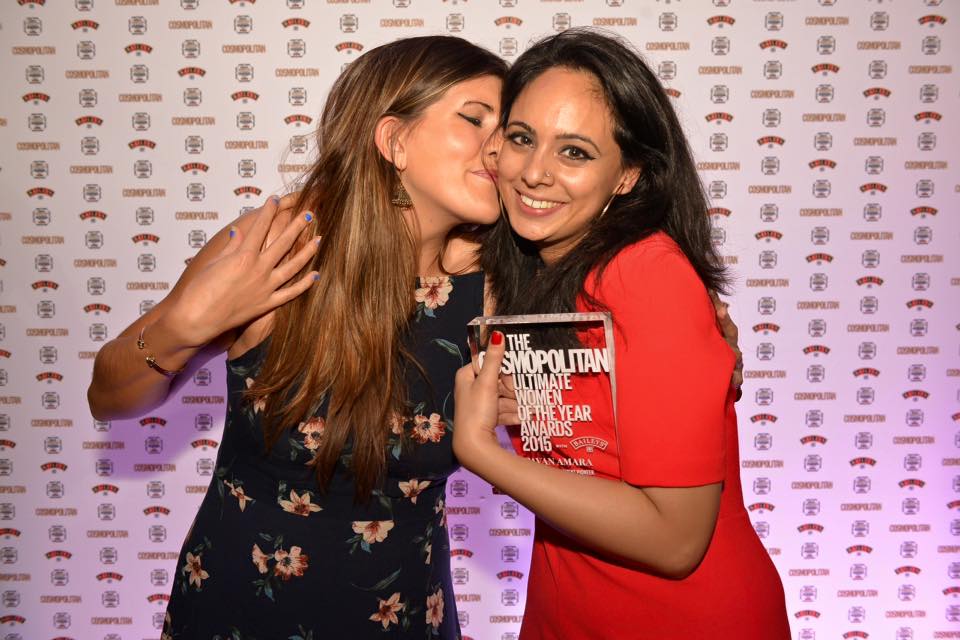 Pavan at the Cosmopolitan Ultimate Woman of the Year Awards. Image Credit: Pavan Amara
Pavan at the Cosmopolitan Ultimate Woman of the Year Awards. Image Credit: Pavan Amara
What did you want to be as a child?
It’s a silly answer. Basically, I wanted to be a sweetshop owner, because I really loved chocolate and there were these two ladies who used to run a sweet shop near us and they were the happiest ladies in the world. I think I just thought my life would be like theirs. I’d grow up and I’d own a sweet shop and it’d be really great and everything would be really happy and I’d get chocolate. You know those sorts of people who are really warm? Basically, they were the happiest people in the world.
How did your formal education shape you?
To be honest, it didn’t really. I left school when I was 16 and I don’t think I did particularly well in it. I think there were lots of reasons: there were lots of distractions and I found it quite patronising because you didn’t get a choice in the matter. Also, I think, if I’m really honest, my brain is far more stable and settled now compared to when I was a teenager. I found it really difficult to settle my brain. Now I feel like I can sit for hours, I can read. I just don’t think many teenagers are designed to do that.
What is the most important thing your parents taught you?
Well, I think two things. One was resilience. My parents weren’t soft people, which isn’t a bad thing at all – I say it in a way which is very complimentary to them. But they weren’t and I think that’s the thing with immigrants to England – often they can’t afford to be too soft as they have to deal with so much stuff. So, I think with us they were very much like ‘get on with it and don’t be soft’, that kind of thing. That was the catchphrase of our upbringing: ‘don’t be soft.’
The other thing was not to be selfish and not to think of yourself so much, and to look at other people and not to think you’re the centre of the world. I think also when parents come from other countries it can be really useful because they give you more of a global perspective.
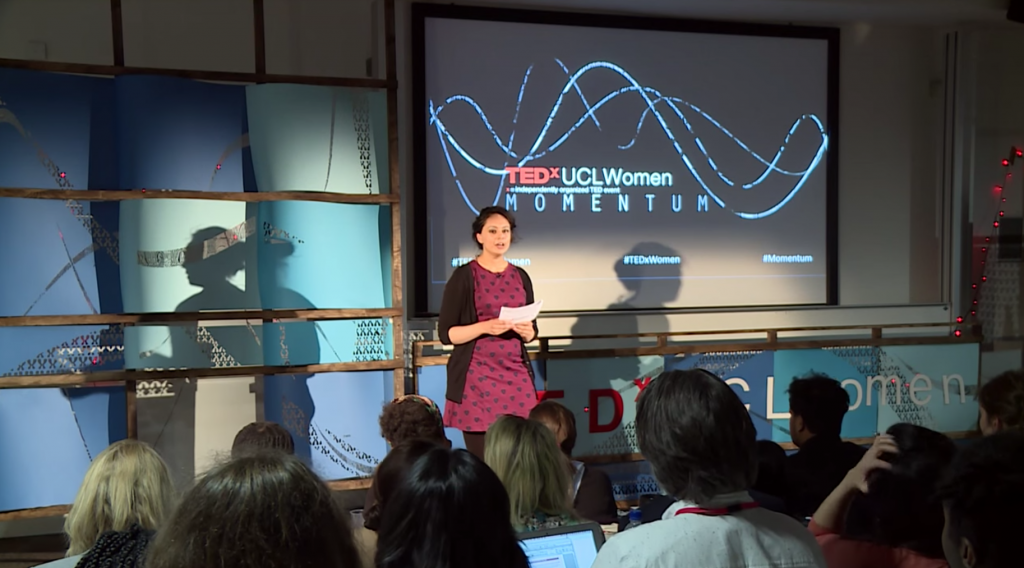 Pavan giving a TedX Talk. Image Credit: Youtube
Pavan giving a TedX Talk. Image Credit: Youtube
What does freedom mean to you?
Even to be sitting here in the pub, having a pint, being able to talk and wear what I want and say what I want, for most women in the world that’s actually not allowed. You wouldn’t be earning your own money, you wouldn’t be able to go out whenever you want. You also wouldn’t have the right to contraceptives – that means you’re stuck at home with loads of kids. You don’t have the right to marry when you want – so you might have a husband.
I have to say, that’s one thing I’m really aware of. I’m very lucky. You know when you compare yourself to other women in your family over the generations? I’m probably the first that’s been able to have that much freedom, which I think is why I massively appreciate it as a woman.
What would you save from your house in a fire?
Practically speaking, I’d take my phone, if it was to hand. I’d need to call 999, I’d want to call my friends. I’d probably be like ‘my house has been set on fire, I really need a cup of tea, can we go to the pub for a pint?’.
What human right do you value the most?
For me, personally, reproductive rights for women. Again, I think it means a lot to me, because if I had been born 20 years earlier, I wouldn’t have had any of that and I probably would have been sat here with eight kids now and it’s terrifying.
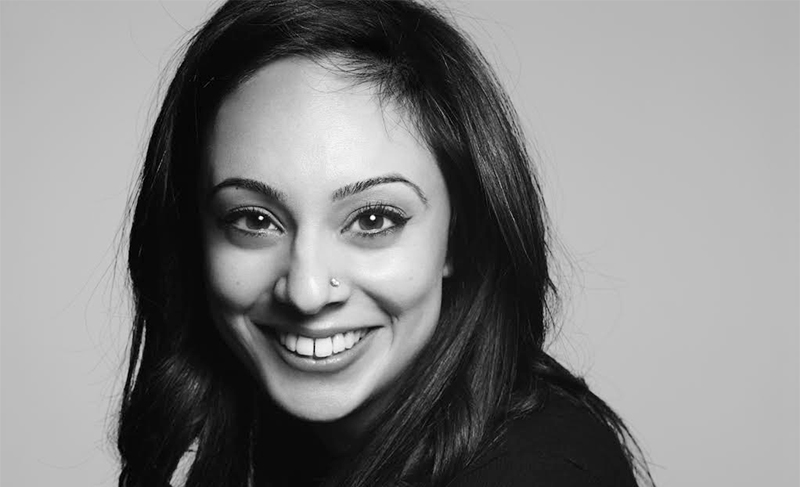
Image Credit: Rankin
Recall a time you’ve been discriminated against
The first time was the biggest shock and it was in reception class. I had a really good friend and we used to play in the sandpit together and she was great. Then one day she was ignoring me and I didn’t know what was wrong. I think I must have asked her and she came out with ‘well my dad says you’re a p*** so I can’t play with you’ and I just knew it was bad. I knew what that word meant, even at that age. I didn’t tell my parents because I didn’t want to hurt them more and I didn’t want to tell my teachers because I felt ashamed that I’d been called that.
The funny thing was, when we were older we went to the same secondary school. At some point, she tried to talk to me and be friends and I didn’t want to talk to her. These things don’t really go away – it still really hurt. It hurt me for months after it happened, even as a five-year-old. So I just came out with it – when you’re hurt things just come out of your mouth – I said, ‘well actually, I remember you saying this to me and it really affected me.’ And she didn’t remember it at all, she had no recollection of it.
What I found really interesting is that for her – and all credit to her, for having admitted it and saying sorry – but for her, it hadn’t even impacted her at all, to the point she didn’t even remember it whereas it’s one of my first memories. I think it shows how sometimes people can say things and I don’t think they realise how that affects another person.
What makes you frustrated?
I could give you a lot of answers to that question! I think when people are judgmental, I think that’s the big thing. When people think they are superior to somebody else, because you’re a different race to them, because you do a different job, or live in a different country. It’s that kind of judging somebody else. You don’t know how hard they’ve had to work to get where they are. You have no idea about them.
What does ambition mean to you?
I don’t really believe in that. If you think of ambition, you don’t follow the natural signs in life and the natural flow of it, and you don’t listen to your heart. Quite a lot of the time, ambition is fuelled by really silly premises of what you should be doing, what you should be and what you should look like. I think people are really good at sucking the fun out of life! It’s all really interesting: you’re a completely different person at 20 compared to 25 and when I’m 80 I’ll be a totally different person again. But if you don’t mesh into these new identities nicely – because you’re so rigid in your old identity – I think you’re wasting a lot of opportunities.
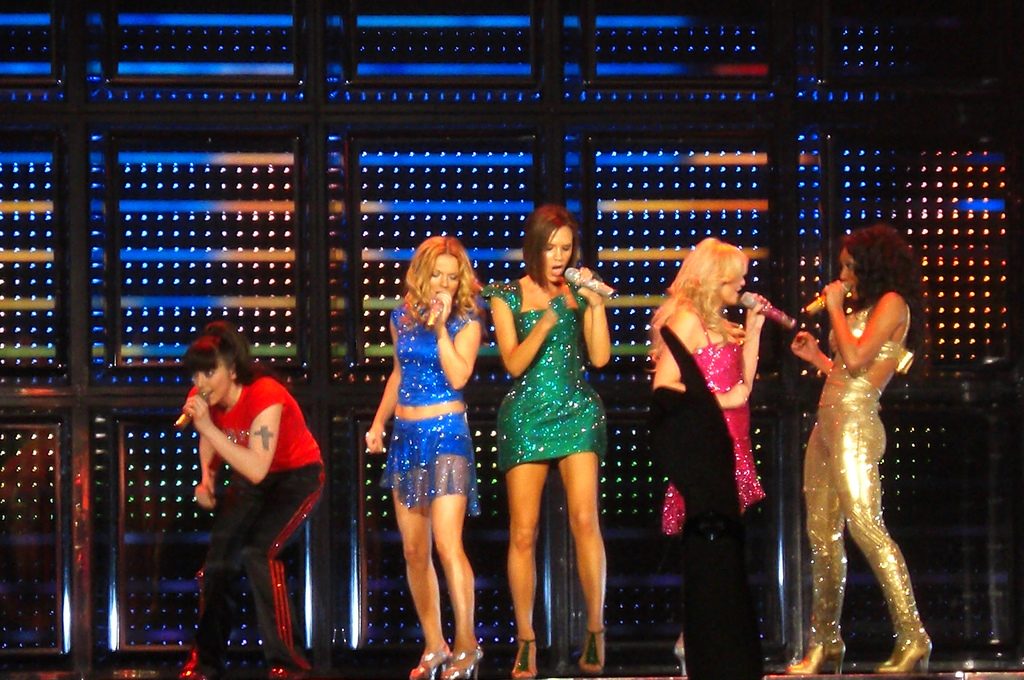
The Spice Girls performing at a concert. Image Credit: Martin / Flickr
Believer, atheist or agnostic?
Again, it’s a totally personal thing and I think religious freedom is really important, but personally, I do believe in something a lot bigger and I do believe in something like god. I kind of think there’s a goodness. I think people use the word god, but I think that means exactly the same thing as love and kindness and goodness. I don’t think there’s a man in the sky or anything. You know when you give something to someone, that nice feeling you feel, I think that’s god basically. You can call it what you like, Allah, god, whatever you want, it’s the same thing.
Do you have a specific memory that sticks out as your best ever?
Yes, I do. It’s a brilliant memory as well. I think it’s always going to be the best memory of my life. When I was 10 I won tickets to see the Spice Girls at Wembley before they split up. I cannot tell you [how excited we were], I think we just screamed the house down. I remember thinking at the time, this is the best night of my entire life. You know when you’re thinking, I’m sharing the same breathing space as my absolute idols? They are your world when you’re 10, and Geri was even wearing her Union Jack dress.
And what’s the meaning of life?
Honestly, I think to be kind. No one can achieve that all the time, but it is love. I think when people hear the word love they feel like it’s romantic love, but it’s so much more than that, it’s a very strong feeling. You don’t have to know that person, you just have to have that empathy and care for them. I think that’s the meaning of life. I think it’s the most important feeling in the world.

